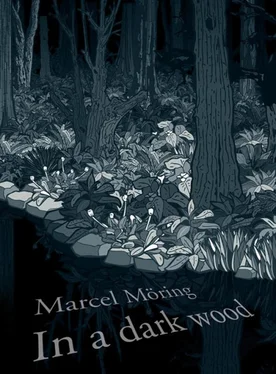‘All the women of Assen?’ Rosa had asked, there in the tabernacle, holding the coffee pot. ‘All the women of Assen,’ Abraham Noah had nodded with his impudent cigar in his mouth.
A man with a mission, she saw in him, a man who would give her a good house and the silk dressing gowns to which her mother was so devoted, and he would never complain as long as she could create the impression of being a good Jewish wife.
That hadn’t been hard for her. A year after the wedding, which was held less than six months after they met in the tabernacle, she gave birth to their first son, whom they named Jacob, and Heijman followed two years later.
And then, one quiet Friday evening, as they were celebrating Sabbath with her parents in the house above the shop, the doorbell was rung once again by a man with a paper bag containing two lumps that no one would ever have recognised as shoes. Abraham had stumbled downstairs and opened the door, and when he came back into the room where the pot of chicken soup stood steaming and the boys lolled sleepily in their high chairs while their grandfather tried to guide to their mouths pieces of challah that made the sound of a steam train on the way, old Deutscher lifted his head, looked at the brown paper bag and collapsed.
How old had he been, Jacob Noah, that evening when his father came into the room with a brown paper bag and his grandfather lowered his head and fell face-first into his grandson’s bowl of chicken soup? Four. Five. No older. But nonetheless: his first memory. His grandfather’s gleaming pate, surrounded by a grey ring of hair, in a bowl of soup.
And of course the chaos that immediately followed: his grandmother, her right hand thrown up over her mouth, her left hand on her chest, sinking down into her chair and only coming to when her daughter rubbed her wrists with vinegar; his father flying out of the door to fetch the doctor; his mother sitting her father upright, wiping his face clean and trying to drag him to the sofa, which didn’t work because the old man slumped against the back of his chair like a wet bag of sand. Heijman, two years old, crowing and exploiting the opportunity to lift his spoon and stoutly smack it into his plate of soup, and he himself, whether that was his memory or the desire to see things like this, looking at the scene, not knowing what was happening, but aware that it was something he would never forget.
Isaac Deutscher had never regained consciousness, and less than two weeks later he was laid to rest in the graveyard behind the Forest of Assen. The shop was taken over by his son-in-law.
Abraham Noah, who had learned the trade at fairs, and had good-naturedly held his ground there amongst drunken farmers’ boys and clog-footed milkmaids, went energetically to work. The shoemaking disappeared into the background, and he had a shop window made, in which the new goods were displayed on blue velvet, and two coloured prints hung on the wall, making the charm and elegance of London and Paris almost tangibly present. The town was not yet ready for that charm, that elegance. Although it was the capital of the province, and the administrative centre, and in the wider surroundings there was not a single shoe shop with such ostentatious chic in its range, the bell seldom rang, and when it did it was to let in a dazed-looking man or woman carrying a rustling brown paper bag in their hand. Even Noah’s attempts to become a member of the shopkeepers’ association failed. His written request to join never received a reply, and when he bumped into the chairman one day in the Kruisstraat, the chairman said that the body could not consider his application because it was after all a Christian organisation. Noah would just have to set up his own association.
Rosa saw her confident Abraham becoming an anxious man who smoked his cigars with diminishing relish, and in whose eyes the spark of boldness was already starting to go out. In the evening, when the children had been sent to bed, he sat at the dining table with cash book and ledger and calculated until the figures, mockingly, it seemed, danced before his eyes and the world appeared to exist only to let him taste the bitter wormwood of his fruitless toil. After a year the shop was bringing in so little that Abraham had to set off on his travels again and Rosa was forced to run the store.
What seemed too much for Abraham Noah’s pride became a challenge for Rosa’s quashed ambitions. Although she assumed her new task with appropriate timidity, it was painfully clear that her life was only now beginning. She hung her silk dressing gowns in a wardrobe with mothballs, rolled her thick brown hair in a tight bun, elaborated a complicated scheme for cooking, cleaning and childcare, and even remembered the principles of shoemaking. She took on an apprentice for the workshop, and single-handedly removed the blue velvet from the window and the French and English prints from the wall. Abraham, who saw the changes occurring after a few months – but only once they had already taken place, because he often came home just before the weekend – shook his head and seemed to shrink into himself both literally and figuratively. During that year after his misfortune, he assumed a resigned, bent posture and began to remember what a friend had said when he told him that he was going to marry Rosa Deutscher, his boss’s daughter. ‘You may never,’ his friend had said, ‘have a beautiful woman all to yourself, but no one owns a clever woman.’ He had, proud of his beautiful and clever wife, laughed at these words. At the time he had heard only the first part, and had not been afraid. Now he began to suspect that the second might also be true.
The shop blossomed. The orthodox still bought from the orthodox, the liberal from the liberal and the few Catholics from the Catholics, but new customers slowly trickled in: young people who thought it possible that a Jew could make shoes that fitted a Protestant, people from somewhere else who had come to live in the town and socialists who weren’t welcome anywhere, and whose numbers were growing. In her shop Rosa sold the same sober footwear as her competitors, but it was with her repairs that she put the name of ‘Abraham Noah Shoes’ on the map. Three years passed like that, and then the whole town knew that Rosa Noah never said that shoes were worn beyond repair and had to be replaced, but that on the contrary she could make a mistreated pair of brogues, boots or lace-ups look almost new. With her level-headed honesty she cultivated a clientele that became so loyal to her and thought so highly of her shop that the business seemed to be built on a foundation of ancient, immovable rock.
Everything has its price, even prosperity wrought from diligent ambition and healthy common sense, and the price paid by Rosa Noah, née Deutscher, was the slow erosion of her once so promising marriage. Abraham, who had always prided himself on his modern, indeed: properly socialist ideas, was able to stomach his wife’s business success, where he himself had clearly failed, only with great difficulty. He became quieter, introverted, sullen. To compensate for the loss of his authority in the shop he became a domestic tyrant who from Friday evening, when he came back from his travels, until Monday morning, when he set off once more for a long and lonely week, had something to say about everything, complained about his wife’s meals and kept his two sons on such a short rein that they were visibly relieved when he left again. As happy and free as the atmosphere was during the week in the house above the shop, so it was suffocating and bleak at the weekend, when the brooding, sombre man who was their father and husband exerted his power over the family.
Although his mother, in spite of everything, seemed to be an alert and spontaneous woman, the realisation travelled all the way to Jacob, as he grew older, that she was actually two women. It was no more than a suspicion, a that-must-be-it, but he barely doubted it and his last doubt fled when he was woken one Saturday evening by banging and clattering and left his bed, with a mixture of unease and curiosity, to seek the source of the noise.
Читать дальше












